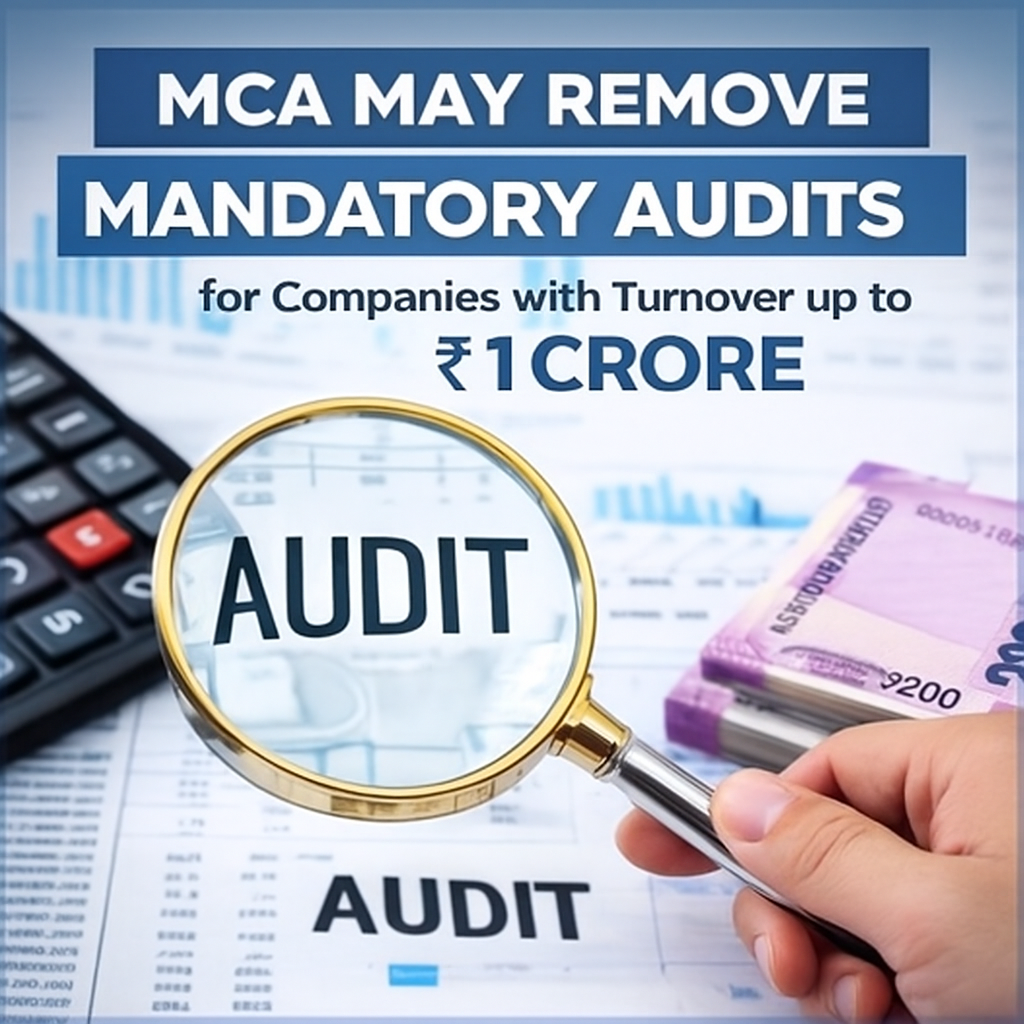Exclusive: MCA may remove mandatory audits for companies with turnover up to ₹1 crore.
1. Concise Rewritten Version
The Ministry of Corporate Affairs (MCA) is considering exempting companies with annual turnover up to ₹1 crore from mandatory statutory audits, signalling a major change in compliance norms under the Companies Act, according to people familiar with the discussions.
The proposed exemption, likely to be brought in through an amendment to Section 139 during the upcoming Winter Session of Parliament, would mark the first turnover-based relaxation in India’s statutory audit framework. Currently, every company—regardless of scale—must appoint an auditor and undergo a yearly statutory audit.
A person directly involved in the deliberations noted that audits of very small enterprises “rarely uncover significant issues and offer limited practical benefit,” adding that most micro-company audit reports “tend to be clean and do little to enhance oversight, while adding to compliance expenses.”
ETCFO’s query to the MCA seeking clarification remained unanswered at the time of publication.
As per existing law, statutory audits underpin the preparation of financial statements, annual general meetings and filings such as AOC-4 with the Registrar of Companies. The requirement applies equally to one-person companies, small companies and closely held private firms.
A former ICAI president cautioned that aligning the ₹1 crore turnover limit with the tax-audit exemption under the Income Tax Act could create a compliance gap. “If companies up to ₹1 crore are exempt from both tax and statutory audits, what mechanism will ensure financial reporting reliability?” he asked.
He further warned that removing the statutory audit for micro-enterprises could reduce transparency in accounting and weaken compliance discipline at the lower end of the corporate ecosystem.
The proposal is still under review, with the draft amendment expected to attract considerable attention once tabled in the Winter Session of Parliament.
2. Neutral News Reporter Style
The Ministry of Corporate Affairs (MCA) is expected to offer statutory audit exemptions to companies with annual turnover up to ₹1 crore, a move that would significantly alter current compliance requirements under the Companies Act, according to sources who spoke to ETCFO on condition of anonymity.
The change is likely to be introduced by amending Section 139 during the Winter Session of Parliament. If approved, it will be the first audit-related relaxation linked to turnover. Presently, all companies, irrespective of size, must appoint an auditor and undergo a statutory audit annually.
A government official involved in the deliberations said that audits of micro-enterprises “seldom bring up material findings and offer limited real value,” pointing out that most such reports “are clean and do not substantially enhance oversight, but do increase compliance costs.”
Emails sent by ETCFO to the MCA seeking responses remained unanswered.
Under existing provisions, statutory audits form the foundation for preparing financial statements, convening AGMs and submitting filings such as AOC-4 to the Registrar of Companies. The requirement applies equally to OPCs, small companies and private entities.
A former ICAI president told ETCFO that extending the ₹1 crore threshold—which already exists under the Income-tax Act for tax-audit exemption—to statutory audits could lead to a regulatory gap. “If both audits are exempted, how will the integrity of financial reporting be ensured?” he asked.
He also cautioned that eliminating statutory audit for micro-level companies may reduce visibility into accounting practices and weaken compliance discipline.
The proposal is still being examined, and the draft amendment is expected to draw significant attention once placed before Parliament during the Winter Session.
3. Detailed Paraphrased Version (Closer to Original but Fully Rewritten)
The Ministry of Corporate Affairs (MCA) is weighing a proposal to exempt companies with annual turnover of up to ₹1 crore from the mandatory statutory audit requirement, representing a major shift in the Companies Act’s compliance architecture, according to people with direct knowledge of the matter who spoke to ETCFO anonymously.
This exemption is likely to be introduced through an amendment to Section 139 during the forthcoming Winter Session of Parliament and would be the first time India considers a turnover-based relaxation in its statutory audit system. Currently, all companies—regardless of their scale or structure—must appoint statutory auditors and undergo yearly audits.
A government official engaged in the consultation process said that audits of micro-level companies “rarely surface any substantial irregularities and offer minimal practical benefit,” adding that most such audit reports “tend to be unqualified and don’t significantly improve oversight, even though they increase compliance expenditure.”
Queries sent by ETCFO to the MCA remained unanswered at the time of going to press.
Under the present legal framework, statutory audits serve as the foundation for preparing financial statements, conducting AGMs and submitting various filings, including AOC-4, to the Registrar of Companies. The audit mandate applies uniformly to OPCs, small companies and private limited firms.
A past president of the Institute of Chartered Accountants of India (ICAI) warned that raising the ₹1 crore threshold—already used for tax-audit exemption under the Income-tax Act—to statutory audits could result in a regulatory gap. “If both tax audit and statutory audit are waived for companies up to ₹1 crore turnover, how will the credibility of financial reporting be safeguarded?” he asked.
He also expressed concern that removing statutory audits for small firms could reduce accountability and weaken compliance behaviour within the lower segment of the corporate sector.
The proposal is still under active discussion, and the draft amendment is expected to attract significant debate once presented in Parliament’s Winter Session.

